
Original Story
To make her father's dream come true, a woman, with the help of her sister, decide to disguise themselves as men and infiltrate a boys hostel run by a strict ward to get money to start a restaurant.
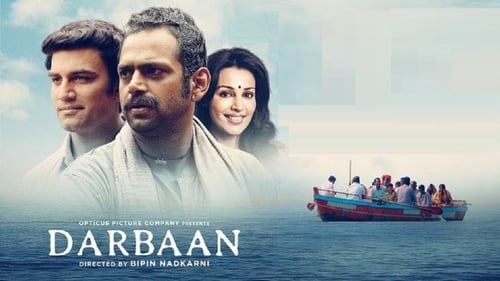
Story
Based on the 1891 short story by Rabindranath Tagore, follows life of a caretaker whose life is disturbed due to a single act of carelessness.

Poem
Inspired by the style and story of La Jetée, this film is entirely shot in quarantine by a few college students each shooting his own part from his home. The story is quite similar to that of the piece from which it is inspired.

Story
Explores the life of a police detective. Based on a short story by Rabindranath Tagore.

Story
At night Deepak narrates his problem to Dr. Khanna. He had committed to his 1st wife Priya, he is a one woman man and all the nights of his life belong to her. After miscarriage Priya became sick and a nurse, Madhu came to look after her. After Priya's death Deepak married Madhu. Now at night whenever Deepak tries to come close to Madhu, he feels Priya is around. After flashback with sunrise Deepak becomes normal. But the question remains does the amount and density of love continues to be the same, once a person is out of sight? And night will again come with it's nightmare after the day. (One Woman Man is inspired by Rabindranath Tagore's story 'Nisithe')

Novel
Ghawre Bairey Aaj is inspired by Rabindranath Tagore's novel 'Ghawre Bairey' (Home and the World) and is a contemporary retelling of love triangle involving Tagore's characters Nikhilesh, Sandip and Bimala.

Author
Sheser Golpo is an Indian Bengali romantic drama film directed by Jiit Chakraborty. The film stars Soumitra Chatterjee as 'Amit Ray' and Mamata Shankar as 'Labanya', in the lead roles.

Lyricist
Since its inception in 1931, Mahishasuramardini has been one of the most popular programmes in Bengali radio, and is currently the longest running radio programme in India, narrated by Birendra Krishna Bhadra. This film is a truthful account of what unfolded in 1976, after Aakashvani decided to replace Birendra Krishna with eminent actor Uttam Kumar in a revamped programme.

Lyricist
Meghla, who after years discovers that her grandmother had been killed in her ancestral home in East Pakistan by a trusted retainer of the family. And many years after the tragedy, she visits Dhaka to trace her roots and faces the murderer's family who now occupies her house. Maati traces Meghla's trials with truth and humanity while tackling issues of migration, human displacement, and relationships.

Story
Based on Rabindranath Tagore’s famous short story 'Kabuliwala', the film is about a young girl’s quest to discover more about her dead father’s friend who used to play bioscope shows for her as a kid.

Story
Based on Tagore’s works, Rebati is attracted to Neela’s seductive charms, the outcome of which leads to an unlikely conclusion. Watch the full movie on Hoichoi.

Lyricist
The story of "Bilu Rakkhosh" revolves around the central protagonist "Bilu" who is a direct product of the hollow modernization the current times are going through. Bilu works in IT in a typical corporate environment, although Bilu finds himself strangled and gasping. He loves singing and always wanted to pursue his career as a singer. But he has got trapped himself within his own demons (hence the name!). Bilu is a man stuck in time. His life circles around the same circumference every day, piling up on the frustration of not being able to follow his heart. In search of an escape Bilu who rebelled to be a puppet of the reality imposed by others as he creates his own through his delusions, for Bilu albeit living with inviolable demons inside, is also a dreamer.

Story
Raktokorobi is a 2017 Indian Bengali film directed by Amitava Bhattacharya, starring Kaushik Sen, Rahul, and Shantilla Mukherjee. It was released in Hollywood as Red Oleanders Raktokarobi with English subtitles.

Story
Neel, an ambitious businessman, has bought a crumbling palace to transform into a luxury hotel. He fails to realize that the stones come to life each night, engulfing anyone that dares to trespass.

Story
Set in early 20th-century rural Bengal, Daak Ghar tells the story of Amal, a young boy with an incurable illness who gets caught up in the world outside of his windo.

Story
Young spirited Nanda Sen leaves his city home and luxury of urban life to join as the village Postmaster of Plassey where his life was comforted with the service of orphan low-caste housemaid Ratna and his only friend there school teacher Rabibabu. Ratna's charm appealed to him and Nanda married her against society and family. Succumbed to his father's last wish to marry a suitable match, Nanda landed in a crisis and escaped his desired family life. Nanda couldn't overcome this sin and finds solace in the next life.

Story
The film recounts the love story of Amit Ray, a barrister educated at Oxford, whose virulent intellectualism reveals itself in its opposition to all forms of tradition. He meets Labanya in a car accident and the romance builds up in the misty hills of Shillong. The iconoclastic Amit clashes with the sincerely simple Labanya. Labanya releases Amit's own submerged depth of sincerity, which he finds hard to adjust to. The struggle makes him a curiously pathetic figure. The tragedy is understood by the girl who releases him from his troth and disappears from his life.

Story
Set in the late 70's of the last century when sharp contrasting values of rural urban divide of our society was facing challenge to come to terms with the fast changing world. Kumudidini, a...

Story
Charulata is a 2013 Indian Bengali film, directed by Biswajit Ghosh and Prasenjit Ghosh and produced by White Horse Picture. The film stars Pritha Sur, Rupam, Subir Sanyal, Sritama Das, Pradip Das, Kamalakanto Dutta and Rupa Guria in lead roles. The music of the film was composed by Ekalabya.
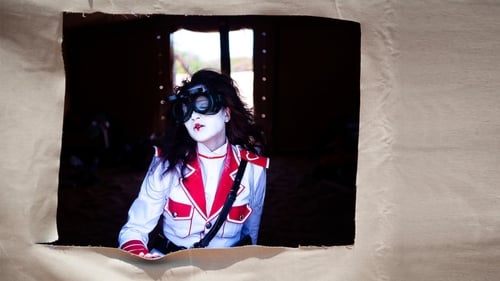
Novel
고전 연극을 각색한 이 판타지 영화에서, 파시스트 통치 하의 섬에 도착한 황태자에게 영감을 받은 이곳 여성들은 반란을 일으킨다.

Lyricist
Satyanweshi is a 2013 Bengali mystery-thriller film directed by Rituparno Ghosh and produced by Shrikant Mohta and Mahendra Soni. This was Ghosh's last full length film as a director. Indian film director Sujoy Ghosh portrayed the character Bymomkesh Bakshi in this film.

Lyricist
Rudra and Partho's desire to adopt a child leads Rudra to take the most crucial decision. Rudra decides to undergo sex reassignment surgery, so that they can be legally considered a couple and allowed to adopt a baby.
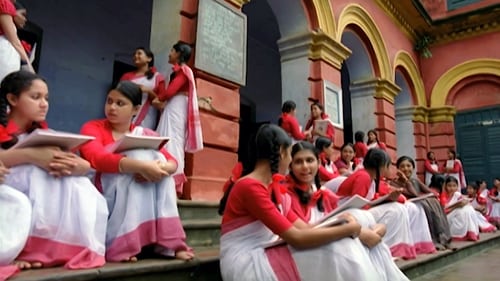
Writer
Indranath is a leader of a group which is fighting for Indian independence. Ela is the teacher of the group. Ela is caught in a dilemma between her love for Atindra and her commitment towards her country.

Original Story
Rameshchandra Chaudhry, a lawyer by profession, is in love with Hemnalini, and is displeased when he finds that his father wants him to marry Sushilla, the daughter of a widow. He initially refuses despite of his father disowning him, but changes his mind when the bride's mother pleads with him, and gets married without even seeing, leave alone getting to know his bride. After the marriage, they board a boat which overturns after a storm, and they end up being the only survivors. Unable to get Hemnalini out of his mind, he refuses to be intimate with his bride. On talking with her gradually over the next few months, it slowly sinks in that she is not Sushilla but Kamla - the bride of another male! The question remains: what can he do under these circumstances, and what impact will this have on Kamla - who has traditionally accepted him as her husband.

Writer
Amal is a seven-year-old Indian boy who is orphaned when his father dies and has to move to another part of India with his uncles. Amal integrates quickly and meets the different characters that open a new world for him. But what catches his attention the most is a post office in front of his house. His greatest hope would be to receive a letter from the Raja and become a postman, so he would travel all over India.

Novel
Defying his father’s wishes by following his rebellious uncle’s example, a young Bengali from an upper caste tries to help those on the lower end of the spectrum and, while he’s at it, offers to marry his brother’s pregnant mistress.

Music
Two Bangladeshi girls born and raised in London have weddings arranged for them against their will by their family. Shahanara, the rebel of the family, banished from the family in her teens for being "too Western", has to swap her pink hot pants for a sari as she goes off to the airport to meet her new Bangladeshi husband. Her sister Hushnara is the opposite of Shahanara; a devout Muslim who agrees to marry so she doesn't upset her parents.

Writer
Rahmat, a fruit seller from Kabul, comes to Bengal Province to hawk his merchandise and becomes friend of a small girl Mini, daughter of a Bengali writer.

Writer
Shuvaa was named as Shuvashini (one who has melodious voice) but she grows as deaf and dumb. Her father married off her two elder sister Suhashini and Sukeshini with grant ceremony. Now its Shuvaa's turn. Shuvaa and Protap from the same village love and understand each other. Protap asked her father to marry her and her father comes to Protap's parents with marriage proposal. Govinda Goswami refuses the proposal and insults him. Being refused and insulted, Banikonto leaves the village with his daughter and wife to his eldest daughter's house to marry off Shuvaa. Soon after her marriage, her husband Nibaron learns Shuvaa's condition that brings misery for her.

Story
A portrayal of a male dominating era, where women are blamed and punished for everything.
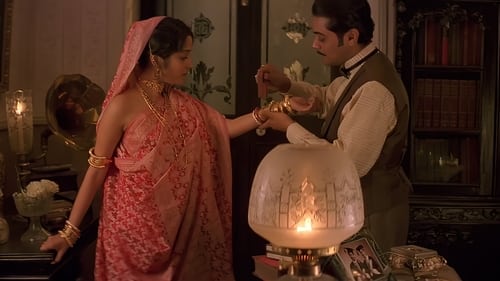
Novel
A young woman is left to her own devices when her sickly husband dies. Based on the novel by Rabindranath Tagore.

Story
This film is based on five shot stories of Rabindranath Tagore's Jibito O Mrito, Sarat Chandra Chattopadhyay's Abhagir Swarga, Gour Kishore Ghosh's Aei Daha, Prafulla Roy's Satgharia and Dibyendu Palit's Kaanch.

Poem
Rohini is caught up in an endless whirl of shooting schedules. Her parents are hardly a part of her life. Things change when she discovers that her longtime boyfriend has been having an affair with another actress around the same time her mother is hospitalised.
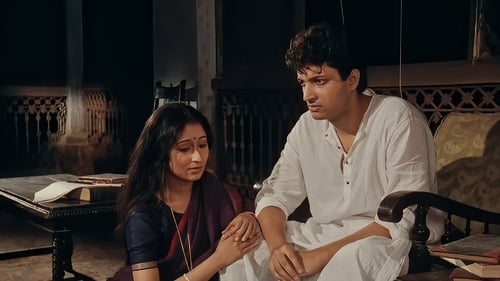
Story
Set in the Bengali Renaissance of the 1930s and 1940s. A group of young intellectuals get embroiled in the struggle for Indian independence, sometimes at the expense of their personal lives.
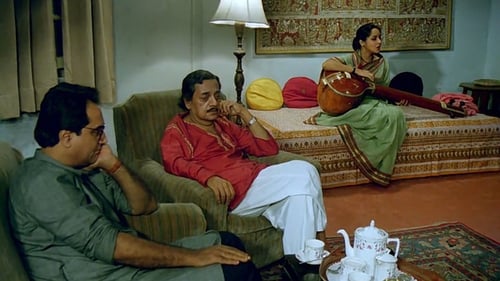
Lyricist
A well-off Indian family is paid an unexpected, and rather unwanted, visit by a man claiming to be the woman's long lost uncle. The initial suspicion with which they greet the man slowly dissolves as he regales them with stories of his travels, tales that are at odds with their conventional middle class perspective on the world.

Story
Samir Niyogi lives in India and is assigned by the Government to travel to Rajasthan, evaluate a princely castle that once belonged to Raja Param Singh, take stock of all items, the condition of the building, and report back to the Government. Enroute to his destination by train, he permits a woman to enter his compartment, goes to sleep, and when he awakens finds her gone. A few days later, when he goes to the castle, he finds the very same woman cooking within the premises.
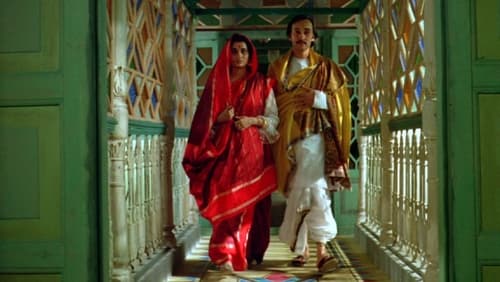
Lyricist
When the movie opens, a woman is recalling the events that molded her perspective on the world. Years ago, her husband, a wealthy Western-educated landowner, challenged tradition by providing her with schooling, and inviting her out of the seclusion in which married women were kept, to the consternation of more conservative relatives. Meeting her husband's visiting friend from college, a leader of an economic rebellion against the British, she takes up his political cause, despite her husbands warnings. As the story progresses, the relationship between the woman and the visitor becomes more than platonic, and the political battles, pitting rich against poor and Hindu against Moslem, turn out not to be quite as simple as she had first thought.

Novel
When the movie opens, a woman is recalling the events that molded her perspective on the world. Years ago, her husband, a wealthy Western-educated landowner, challenged tradition by providing her with schooling, and inviting her out of the seclusion in which married women were kept, to the consternation of more conservative relatives. Meeting her husband's visiting friend from college, a leader of an economic rebellion against the British, she takes up his political cause, despite her husbands warnings. As the story progresses, the relationship between the woman and the visitor becomes more than platonic, and the political battles, pitting rich against poor and Hindu against Moslem, turn out not to be quite as simple as she had first thought.

Story
A film by Swadesh Sarkar.

Songs
A political film reflecting the turbulent times of the '60s and '70s.

Music
Four men, each peculiar in his own way, embark on a quest to reason with the estranged wife of the protagonist. This film is considered to be Ghatak's autobiographical film.

Music
Tensions between two brothers arise when one of their daughters marries a government employee. Meanwhile, when Udas' first wife dies and his childhood sweetheart rejects him, he becomes an alcoholic, characterless bohemian kind of person. One day after a quarrel, When he hears a baseless and incorrect news that Padma was having an affair with the doctor, he comes to murder the doctor with a knife. In the darkness, drunken Udas killed his old mate Padma. As a result, he was convicted and sentenced to death.

Story
Amol, a child, is confined to his adoptive uncle's home by an incurable disease. He stands in the courtyard and talks to passers-by and inquires about the places they go to. The construction of a new post office nearby prompts the imaginative Amol to fantasise about receiving a letter from the King or being his postman.

Story
A young doctor is introduced to a girl by his cousin, but he rejects her as a potential bride and she disappears one day, leaving only a garland of dried flowers behind.

Lyricist
Reena was a very honest/beautiful and tomboy type village girl who lived with her grandfather in East Bengal. She developed a very close relationship with her simple style of living. But Partition of India creates problems for them. Reena had to came to Kolkata in her maternal uncles home . But here she faced a totally different scenario. The lifestyles were too different. She was not able to adjust properly. In a social gathering a local Entrepreneur Mr. Bagchi observed it but he began to like Reena. After a while they got married together. Then they were blessed with a child . But Reena was not all comfortable with her child’s value system and psychology. So a complication was born between them. This is a story of different perspectives who forced to live life together bonded in a relationship.

Lyricist
Inspired by the life of Rishi Aurobindo, it’s a Bengali classic portraying the life of Sri Aurobindo Ghosh beginning from his return to India in 1892 to his life in Pondicherry in 1910. This film shows a detailed narration of his early life, marriage, interaction with Sister Nivedita, contributions in India’s freedom struggle and activities in Jugantar, Alipore bomb blast case, and the subsequent trial.

Story
Anoop studies law in Calcutta, while his widowed mom in a small town in West Bengal. He has a sister, Sudha, who is married to Anil and lives in Calcutta. Since Anoop is of marriageable age, his mom has seen a girl for him, whose name is Vidya, and is the daughter of Shankarlal. When Anoop returns home, she asks him for his approval, but he says he wants to see the girl first. He goes to see Vidya, and also gets to meet another belle by the name of Minoo. He returns home, tells his mom that he cannot marry Vidya, but will marry only Minoo.

Story
The Tagore story is a pure fantasy. Shekar Chaterji, a teacher lives in a village along with his wife (Sova Sen) and his son. He is a strict father. And his son is a mischievous lad. His son's wayward ways is a constant source of irritation to Shekar Chaterji. Complaints from villagers about his misdeeds keep pouring in. Inspite of his strictness, Shekar Chaterji is unable to keep his son at bay. His son even dares to bunk from the class while he is teaching. His disciplinary actions create a gulf in the family relations. Both his wife and son are at loggerheads with him.

Lyricist
Sata Bose, the receptionist of hotel Shahjahan and other crew members work hard to make the hotel first choice of the upper class for socializing in the city, just got the taste of freedom from British rule. The movie revolves around different characters - hotel employees to page 3 personalities dealing different human emotions. Although Sata Bose (played by Uttam Kumar) is the central character of the film, he is not the protagonist in many ways, rather the movie can be described as "hyperlink movie" made long ago than the term is coined.

Story
This is the story of the wanderlust in a teenage boy, Tarapada, who often ran away from his home for days to join groups of wandering players, musicians and acrobats. Based on a story by Rabindranath Tagore.

Story
Amal, a young boy with an incurable disease is trapped inside the house by the local pandit-doctor’s orders. He spends the day chattering with passersby and villagers while daydreaming about those encounters later. When the chowkidar tells him the new building across the road from his house is a new Post Office belonging the Raja, Amal starts fantasising about visiting the King beyond the hills, and getting a letter or delivering the letters going all around, setting out from the confine of his house
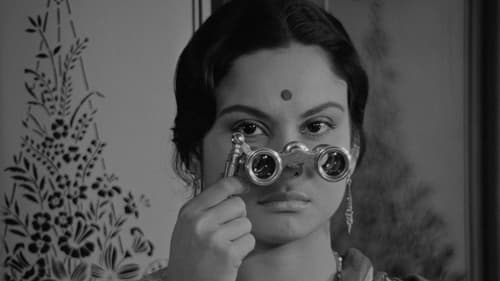
Lyricist
1870년대 인도. 차루는 외롭고 한가한 생활을 하고 있다. 차루의 남편 부파티는 가정생활보다 신문제작에 더 많은 시간을 할애하기 때문이다. 남편의 사촌이자 시인인 아말이 그들의 집으로 오게 되고, 차루는 아말과 문학적 교감을 나눈다. 위태로운 결혼생활의 모습과 자신의 목소리를 확립하기 위한 첫걸음을 내딛는 여성의 이야기를 담았다.
(영화의 전당)

Story
1870년대 인도. 차루는 외롭고 한가한 생활을 하고 있다. 차루의 남편 부파티는 가정생활보다 신문제작에 더 많은 시간을 할애하기 때문이다. 남편의 사촌이자 시인인 아말이 그들의 집으로 오게 되고, 차루는 아말과 문학적 교감을 나눈다. 위태로운 결혼생활의 모습과 자신의 목소리를 확립하기 위한 첫걸음을 내딛는 여성의 이야기를 담았다.
(영화의 전당)

Story
A poor Afghani leaves his family behind to earn a living as a dried fruit vendor in India. Profoundly homesick, he befriends a young girl who reminds him of his own daughter. Meanwhile, the locals are distrustful of all foreigners.

Short Story
A poor Afghani leaves his family behind to earn a living as a dried fruit vendor in India. Profoundly homesick, he befriends a young girl who reminds him of his own daughter. Meanwhile, the locals are distrustful of all foreigners.

Author
'Teen Kanya' is an anthology film based upon short stories by Rabindranath Tagore, as a tribute on the author's centenary. The title means "Three Daughters", and the film's original Indian release contained three stories, with three central female characters linking the stories together. 'The Postmaster' concerns an orphan girl who grows attached to the postmaster she is caring for after he teaches her to read and write. 'Monihara' is a supernatural tale about a woman obsessed with the jewels her husband buys for her. 'Samapti' follows a young man who falls for an unconventional girl from his new village instead of his arranged bride, the daughter of a respectable family. The international release did not include 'Monihara', and was released as 'Dui Kanya', or "Two Daughters".

Self (Archive footage)
Docudrama about the life of Rabindranath Tagore, Indian polymath—poet, writer, playwright, composer, philosopher, social reformer and painter, who reshaped Bengali literature and music as well as Indian art, becoming in 1913 the first non-European and the first lyricist to win the Nobel Prize in Literature. The film was released during Tagore's birth centenary year.

Lyricist
The plot revolves with Raicharan's tragic life. He is the obedient servant of local zamindar and takes care of zamindar's son whom he addresses as Khokababu. One day the little son dies in an accident in river flood and he is blamed for the same. In a delusional state, Raicharan starts believing his own infant to be his much loved khokababu and brought him up only to return him to his master.

Story
The plot revolves with Raicharan's tragic life. He is the obedient servant of local zamindar and takes care of zamindar's son whom he addresses as Khokababu. One day the little son dies in an accident in river flood and he is blamed for the same. In a delusional state, Raicharan starts believing his own infant to be his much loved khokababu and brought him up only to return him to his master.

Story
A tax collector posted to a small town puts up at a mansion feared by the locals because it is haunted. As time passes he grows more consumed by the mansion and its air of romance, and the spirits that haunt it, especially a beautiful woman. Adapted from a Rabindranath Tagore story.

Lyricist
The plot revolves with series of flashbacks which reveals a judge's past and hidden secretes. Gyanendra, a judge lives with his wife Sarama. Being the Judge, every time of trial of similar cases he remembers his past, the truth about his questionable actions. Gyanendra always recalls when he was a popular lawyer, married to Sumoti, a suspicious and rude lady. But he had a weak feelings for his professor's daughter Sarama. One day Gyanendra's house was burnt and his first wife Sumoti dies. Gyanendra could not make any attempt to save her perhaps he was unable bear Sumati further. Thereafter he marries Sarama and becomes a judge but he realizes his crime and those past haunts him much.

Story
Rahmat, a middle-aged fruit seller from Afghanistan, comes to Calcutta to hawk his merchandise and befriends a small Bengali girl called Mini who reminds him of his own daughter back in Afghanistan. One day Rehmat receives news of his daughter’s illness and decides to return to Afghanistan. But before he goes a violent fight with a customer leads to Rehmat killing him. He gets out of prison ten years later. Based on a Rabindranath Tagore story.
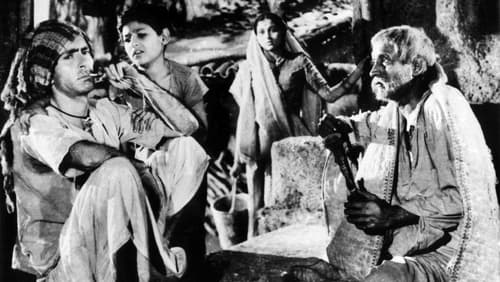
Poem
An impoverished man and his young son travel to Calcutta and look for work, in order to make money that'll save their ancestral land from being seized by a corporation.

Lyricist
Bou Thakuranir Haat is a Bengali drama film directed by Naresh Mitra based on a novel of Rabindranath Tagore in the same name, published in 1883. The film is based on the real-life story of Jessore Raj Pratapaditya. Pratapaditya is described as an antagonist more than a protagonist in this film.

Story
Bou Thakuranir Haat is a Bengali drama film directed by Naresh Mitra based on a novel of Rabindranath Tagore in the same name, published in 1883. The film is based on the real-life story of Jessore Raj Pratapaditya. Pratapaditya is described as an antagonist more than a protagonist in this film.

Music
Kamona is a Bengali drama film directed by Nabendu Sundar. This movie was released on 4 March 1949 in the banner of Kirti Pictures. This is the second film of Bengali actor Uttam Kumar after Drishtidan and debut as the leading person crediting him as Uttam Chatterjee instead of Arun Kumar Chatterjee.

Lyricist
Kamona is a Bengali drama film directed by Nabendu Sundar. This movie was released on 4 March 1949 in the banner of Kirti Pictures. This is the second film of Bengali actor Uttam Kumar after Drishtidan and debut as the leading person crediting him as Uttam Chatterjee instead of Arun Kumar Chatterjee.

Story
A young law student is forced into an arranged marriage though he is in love with somebody else. Following the wedding the drama focuses on the bride's mistaken identity and the search for her husband.

Story
Gora and Mahim were two sons of Krishna Dayal Babu. From childhood, Bijay and Gora were friends. Through an accident, Bijay was introduced to Paresh Babu's family. Paresh was a Bramhin. So Gora did not like Bijay's visit to that house. Gora's mother was very anxious about Gora's Hindusim. Krishna Dayal was also very annoyed being an orthodox Hindu. As per his father's request, Gora went to Paresh Babu's house. Paresh babu's wife Bhadra Sundari was not happy seeing Gora there. But Gora had a real conflict with Haran Babu. The marriage of Haran Babu and Suchitra was almost fixed. The reason of the conflict was that, Haran Babu always thought of himself to be a social reformer and saviour of Brahma religion.

Writer
A simple recording of Tagore's 1926 dance drama on Buddhist legend.

A simple recording of Tagore's 1926 dance drama on Buddhist legend.

Director
A simple recording of Tagore's 1926 dance drama on Buddhist legend.

Story
This rich Gopinath ignores his beautiful wife Giribala, preferring the company of the stage actress Labanga. Tired of his only pastime, dressing up in narcissistic solitude, Giribala one night follows her husband to the theatre where a new world opens up for her. When Gopinath runs off with Labanga, Giribala joins the stage in Labanga's place and becomes famous. The hypocrisy of men's moral double standards is revealed when Gopinath recognizes his wife on stage when her veil drops.

Story
The story addresses the conflict between reformist enlightenment and obsolete, inhuman ritual, questioning the contemporary validity of traditional rituals. The dramatic pivot is the conflict between the king who banned animal sacrifice, and the priest who calls for the king's own blood. Emotionally, the film revolves around the childless queen and a beggar girl whose pet goat has been taken for the sacrifice and who loves a servant in the temple.

Story

Author
The film is based on Rabindranath Tagore's novel Dui Bon which was first published in 1933 and is among one of Tagore's last three works.



















